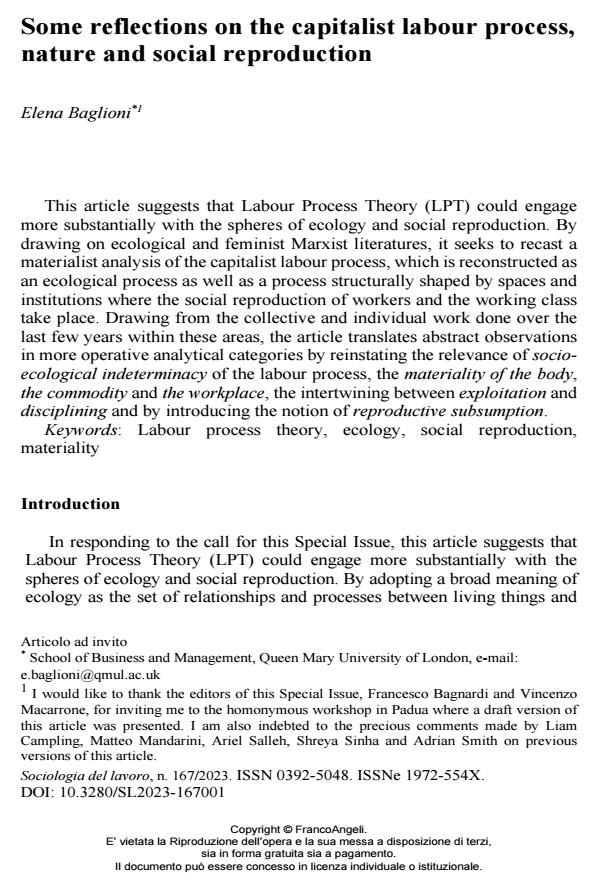Some reflections on the capitalist labour process, nature and social reproduction
Titolo Rivista SOCIOLOGIA DEL LAVORO
Autori/Curatori Elena Baglioni
Anno di pubblicazione 2024 Fascicolo 2023/167
Lingua Inglese Numero pagine 24 P. 9-32 Dimensione file 286 KB
DOI 10.3280/SL2023-167001
Il DOI è il codice a barre della proprietà intellettuale: per saperne di più
clicca qui
Qui sotto puoi vedere in anteprima la prima pagina di questo articolo.
Se questo articolo ti interessa, lo puoi acquistare (e scaricare in formato pdf) seguendo le facili indicazioni per acquistare il download credit. Acquista Download Credits per scaricare questo Articolo in formato PDF

FrancoAngeli è membro della Publishers International Linking Association, Inc (PILA)associazione indipendente e non profit per facilitare (attraverso i servizi tecnologici implementati da CrossRef.org) l’accesso degli studiosi ai contenuti digitali nelle pubblicazioni professionali e scientifiche
This article suggests that Labour Process Theory (LPT) could engage more substantially with the spheres of ecology and social reproduction. By drawing on ecological and feminist Marxist literatures, it seeks to recast a materialist analysis of the capitalist labour process, which is reconstructed as an ecological process as well as a process structurally shaped by spaces and institutions where the social reproduction of workers and the working class take place. Drawing from the collective and individual work done over the last few years within these areas, the article translates abstract observations in more operative analytical categories by reinstating the relevance of socio-ecological indeterminacy of the labour process, the materiality of the body, the commodity and the workplace, the intertwining between exploitation and disciplining and by introducing the notion of reproductive subsumption.
Parole chiave:Labour process theory, ecology, social reproduction, materiality
- Labor regimes, long-distance commuting, and the spaces of production and social reproduction in large-scale mining Felipe Irarrazaval, Miguel Atienza, in Journal of Economic Geography lbaf011/2025
DOI: 10.1093/jeg/lbaf011 - Auf dem Weg zu einer umfassenden Forschungsperspektive auf die lebendige Arbeit Jacqueline Kalbermatter, in Arbeit /2025 pp.17
DOI: 10.1515/arbeit-2025-0003
Elena Baglioni, Some reflections on the capitalist labour process, nature and social reproduction in "SOCIOLOGIA DEL LAVORO " 167/2023, pp 9-32, DOI: 10.3280/SL2023-167001